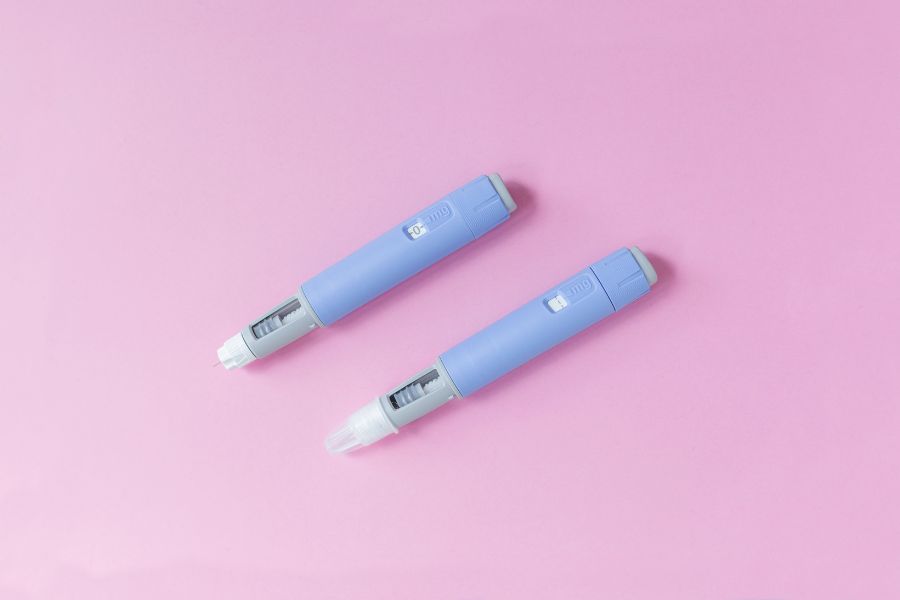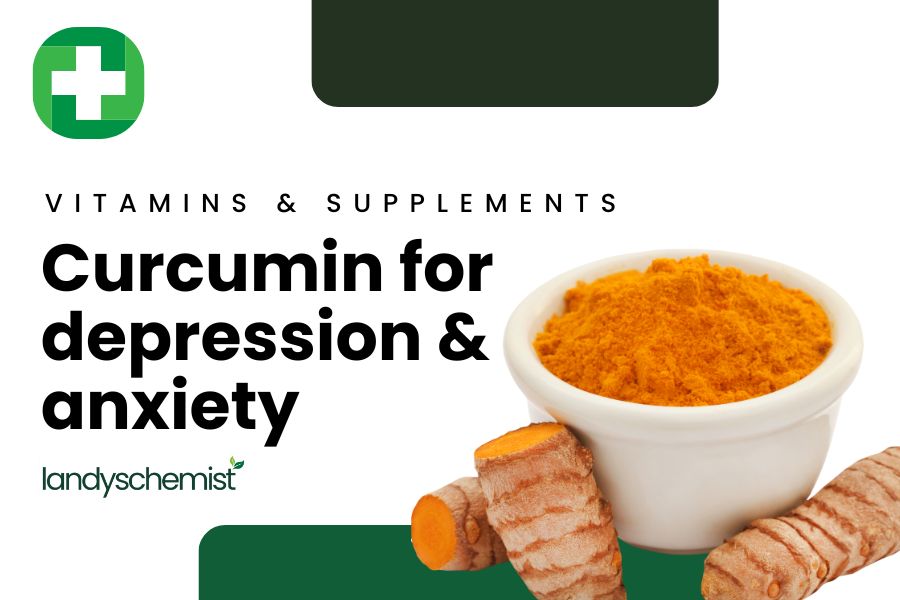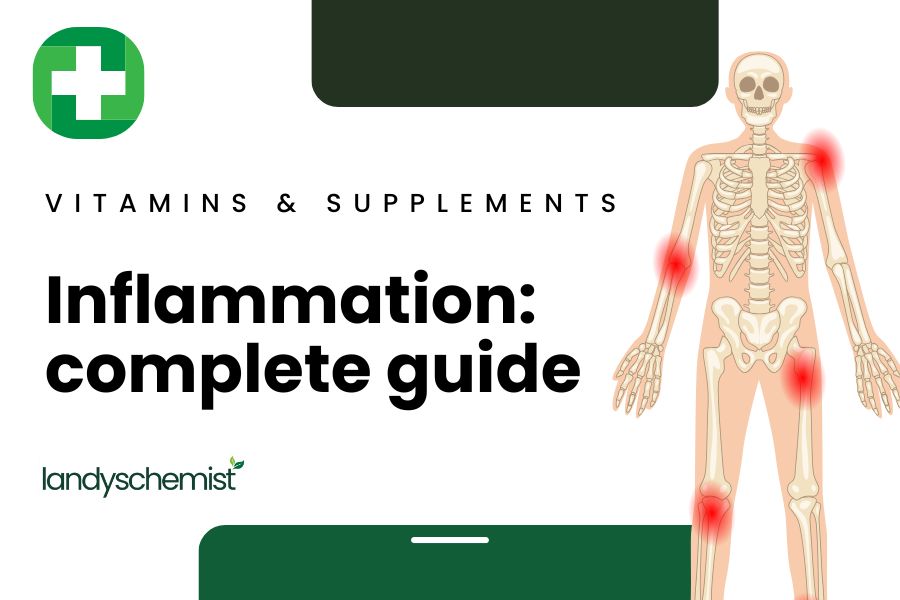
Best GLP-1 Supplements UK
Last updated: 2025-07-24

The best GLP-1 supporting supplements include berberine, curcumin, probiotics, and green tea extract. These natural ingredients may help activate GLP-1 (Glucagon-Like Peptide-1), which is a gut hormone that regulates blood sugar, reduces appetite, and supports healthy weight management. Often seen as natural alternatives to medications like semaglutide (Ozempic) and liraglutide, GLP-1 supplements can offer a more holistic way to manage type 2 diabetes, weight, and metabolic health. At Landys Chemist, we focus on science-backed nutrients that support GLP-1 pathways naturally and effectively.
What is GLP-1?
GLP-1 (Glucagon-Like Peptide-1) is a natural hormone made in the gut that helps regulate blood sugar, control appetite, and support metabolic health. It works by increasing insulin release when blood sugar rises and reducing the release of glucagon — a hormone that raises blood sugar. This helps prevent sharp spikes after meals. GLP-1 also slows how quickly your stomach empties, which helps you feel fuller for longer. These combined effects make GLP-1 important for managing type 2 diabetes, reducing cravings, and supporting healthy weight loss.
Why do people take GLP-1 agonists like semaglutide?
GLP-1 agonists such as semaglutide (Ozempic) and liraglutide are prescribed to help people with type 2 diabetes or obesity manage blood sugar, reduce appetite, and support weight loss. These medications mimic the action of the natural GLP-1 hormone, helping to increase insulin, lower glucagon, and promote a feeling of fullness after eating.
For people with type 2 diabetes, GLP-1 agonists can help stabilise blood sugar and reduce the risk of long-term complications. For those with obesity, they support sustainable weight loss and metabolic improvements.
However, they are not usually prescribed for individuals without diabetes or obesity purely for weight loss. They may also cause side effects, including:
- Nausea and digestive discomfort
- Diarrhoea or constipation
- Fatigue or headaches
- Low blood sugar (especially when combined with other diabetes medications)
The Best Natural GLP-1 Supplements
If you're looking for a more natural way to support GLP-1 activity, certain supplements have been shown to mimic or enhance the body’s GLP-1 response. These can help regulate blood sugar, reduce appetite, and support healthy weight management. Backed by scientific research and used as part of holistic health routines, the following natural GLP-1 activators are worth considering:
1. Berberine:
Berberine is a plant compound popularly known for its ability to regulate blood sugar and enhance metabolism. Research indicates that berberine indirectly activates AMPK, an enzyme that improves insulin sensitivity and stimulates GLP-1 secretion, supporting both blood sugar balance and appetite control. A 2022 review of 18 studies on berberine’s effects on weight and 23 studies on BMI showed significant reductions in both weight and BMI, primarily among people taking more than 1 gram daily (1,000mg) for over 8 weeks. To obtain this effective dosage we recommend Coyne’s Bio-Berberine Complex capsules.
Studies also show a link between berberine supplementation and other weight management factors, such as improved gut microbiota diversity, reduced glucose and cholesterol absorption, and inhibited fat cell formation.
2. Curcumin
Curcumin, the active compound in turmeric, has powerful anti-inflammatory and antioxidant properties, which can also work as a natural GLP-1 activatior. Research shows that curcumin can improve insulin sensitivity and reduce blood sugar levels, aiding in the management of diabetes and weight.
Studies indicate that curcumin may activate pathways like AMPK which plays an important role in energy regulation and glucose metabolism, helping to stimulate GLP-1 secretion. A review of curcumin studies demonstrated its potential to enhance gut health, reduce cholesterol absorption, and inhibit fat accumulation, all of which can contribute to weight management. If you’re on the search we recommend Coyne Healthcare Bio-Curcumin Capsules, a more affordable alternative would be Nature's Plus Source of Life Garden Curcumin Capsules.
3. Probiotics:
Specific probiotic strains, especially Lactobacillus and Bifidobacterium, have been found to support GLP-1 activation by positively influencing gut microbiota balance. The enhancement of GLP-1 secretion through a balanced gut microbiota may aid in blood sugar control, appetite regulation, and weight management, all of which are crucial for managing type 2 diabetes and obesity.
Research shows that synbiotic and probiotic supplements may also improve insulin sensitivity, lower gut inflammation, reduce cholesterol, and limit fat storage, contributing to effective weight loss and metabolic health. Taking probiotics with resveratrol may also enhance GLP-1 secretion, improve glucose tolerance, and support insulin release, offering additional benefits for blood sugar control and gut health in managing type 2 diabetes. If you’re looking for a powerful probiotic we recommend Living Nutrition’s Organic Fermented Symbiotic Capsules. Due to its unique fermentation process, this symbiotic contains carefully selected strains linked to GLP-1 activation.. It’s also rich in phytonutrients, enzymes, peptides, and polyphenols, enhancing bioavailability and effectiveness for metabolic and digestive support
4. Green Tea Extract:
Green tea extract, particularly high in epigallocatechin gallate (EGCG), has shown potential in enhancing GLP-1 secretion and supporting metabolic health. Studies indicate that the combination of EGCG and caffeine from green tea may boost GLP-1 levels, inhibit gastric motility, and promote feelings of fullness by stimulating the satiety centre in the brain. These actions can support appetite regulation and weight management, which are beneficial for those with type 2 diabetes and obesity. Additionally, researchers observed that both undigested and digested green tea and turmeric extracts stimulated the release of satiety hormones, cholecystokinin (CCK) and GLP-1 in cells. Terranova’s Turmeric & Matcha Green Tea Capsules combines the benefits of turmeric and matcha, providing a potent source of EGCG and curcumin to support GLP-1 activation.
Can You Take These Natural Supplements with GLP-1 Agonist Medications?
Some natural supplements such as like berberine, curcumin, probiotics, and green tea extract may be taken alongside GLP-1 medications such as semaglutide or Mounjaro. However, because these supplements can also lower blood sugar or affect metabolism, combining them with prescription GLP-1 agonists could increase the risk of side effects or interactions.
Conclusion
Natural GLP-1 activating supplements like berberine, curcumin, probiotics, and green tea extract provide promising options for supporting blood sugar regulation, appetite control, and metabolic health.
While these supplements may offer similar benefits to GLP-1 agonist medications like semaglutide, they tend to have fewer and milder side effects than these medications, which are often associated with nausea, digestive discomfort, and other issues.
For those seeking a more holistic approach to managing type 2 diabetes, weight, and metabolism, these natural supplements can be valuable, either on their own or as a complement to GLP-1 medications. It is also important to be mindful of the diet and lifestyle changes that can support your journey.
However, if you are already taking GLP-1 medications, consulting with a healthcare provider is essential to ensure safe integration and avoid potential interactions.
References:
- https://www.frontiersin.org/journals/pharmacology/articles/10.3389/fphar.2022.1015045/full
- https://www.sciencedirect.com/science/article/abs/pii/S0041008X16303957
- https://www.nccih.nih.gov/health/berberine-and-weight-loss-what-you-need-to-know
- https://www.sciencedirect.com/science/article/pii/S0753332220303292
- https://www.sciencedirect.com/science/article/abs/pii/S0006291X13007468
- https://pmc.ncbi.nlm.nih.gov/articles/PMC4338652/
- https://www.sciencedirect.com/science/article/pii/S1347861319302609
- https://pmc.ncbi.nlm.nih.gov/articles/PMC8775659/
- https://www.sciencedirect.com/science/article/pii/S1756464619305882
- https://pmc.ncbi.nlm.nih.gov/articles/PMC10790698/
- https://pubmed.ncbi.nlm.nih.gov/29931423/
- https://pmc.ncbi.nlm.nih.gov/articles/PMC8091914/
- https://pmc.ncbi.nlm.nih.gov/articles/PMC10346988/
- https://europepmc.org/article/MED/3022652
Disclaimer: This article is for informational purposes only and is not a substitute for medical advice. Consult your doctor or healthcare provider before starting any supplements, treatments, or remedies. Ensure a varied and balanced diet and a healthy lifestyle before considering supplements. Supplements should not replace a balanced diet.




